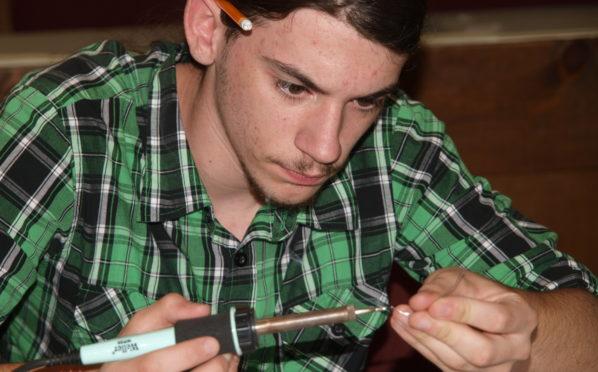
Outstanding New Opportunities for Virginia Community College Students Pursuing STEM Degrees
Category: Academics10/02/2014
Virginia’s Community College students pursuing studies in science, technology, engineering or mathematics (STEM) fields statewide have access to new scholarships, research experiences, internships and courses thanks to a NASA grant awarded to the Virginia Space Grant Consortium.
The Consortium’s newly announced program, STEM Takes Flight at Virginia’s Community Colleges, is designed to provide scholarships as well as real-world work and research experiences that foster community college retention in STEM academic tracks through graduation with an associate’s degree or transfer to a four-year institution. Faculty professional development is also offered. The STEM Takes Flight website at www.vsgc.odu.edu/stemtakesflight provides detailed information on all program components described below and links to applications.
The Community College Bridge Scholar (CCBS) component will provide a $5000 award and mentoring to 15 students during the spring 2015 semester and 2015 – 2016 academic year. Freshmen students can apply in fall semester 2014 with applications due November 17. CCBS will help bridge students to next steps in higher education or employment through coaching and mentoring by VSGC staff, four-year college faculty, and by upper classmen.
Through the Build/Fly/Learn component, selected students will work in teams to undertake hands-on paid summer research projects at NASA Langley Research Center. Individual paid student summer research projects at NASA Langley Research Center and NASA Goddard Space Flight Center’s Wallops Flight Facility will also be offered. These opportunities will be open to a total of 38 community college students who have completed their freshman year and are rising sophomores or in their sophomore year at the time of the research experience. Students will work under the guidance of a NASA mentor.
Ten students will receive grant-sponsored internships through the Consortium’s Commonwealth STEM Industry Internship Program. The program is already open to community college students; however, the additional sponsored funding will increase the number of community college students who can be placed. This aspect of the STEM Takes Flight program seeks to reinforce the value of community college students to employers and increase their retention in the workplace.
Three new courses will be offered. Two multi-disciplinary courses designed to engage community college students in mission development and planning will be available through Eastern Shore Community College. Students will develop and fly a sounding rocket payload as part of RockSat-C, a student flight opportunity at NASA Wallops in summer 2016. A third system-wide online course led by Virginia Western and Thomas Nelson Community Colleges will allow faculty-led student teams to tackle the issue of sea level rise and its impact on coastal communities and ecosystems. A service-learning component will bring them to NASA Wallops where they will use geospatial technology and a review of the historical data to study the impact at NASA Wallops. The Old Dominion University’s Mitigation and Adaptation Research Institute (MARI) will advise the teams and provide webinars on the science of sea level rise.
Community college faculty will benefit from the STEM Takes Flight program through a residentialprofessional development workshop in STEM disciplines, scheduled to take place at NASA Wallops Flight Facility in early June 2015. The workshop will focus on the integration of STEM in the NASA workplace. Twenty faculty participants will experience a hands-on case study that will assist them in educating their students about the importance of team work, technical skills and problem solving.
STEM Takes Flight at Virginia’s Community Colleges partners include: the Virginia Community College System (VCCS), Eastern Shore Community College, Virginia Western Community College, Thomas Nelson Community College, NASA Langley Research Center and NASA Wallops Flight Facility.
The initiative also has the support of Governor Terry McAuliffe. “The initiative includes an excellent collection of STEM programs,” he notes. “The goals align with those of my administration to support STEM education and workforce training for Virginia students.”
VCCS Chancellor Glenn Dubois states, “Providing paid real-world work and research experiences for students, scholarship support, and faculty professional development that can bring the excitement of NASA missions and interdisciplinary teamwork into the classroom are worthwhile and impactful opportunities which I heartily support.”
The STEM Takes Flight initiative directly embraces VCCS goals of increasing access to affordable education and training in preparation for workforce success and tripling the number of students graduating with associate degrees, transferring to a four-year institution and/or receiving a workforce credential.
The NASA grant provides $500,000 in funding for a two-year award period. The Virginia Space Grant Consortium (VSGC), which is celebrating its 25th year, is a coalition of the Virginia Community College System, five Virginia colleges and universities, NASA, state educational agencies and other institutions representing diverse STEM and aerospace education, research and workforce development interests.
VSGC affiliate members include: Virginia Community College System; College of William and Mary, Hampton University, Old Dominion University, University of Virginia, Virginia Tech, NASA Langley Research Center, NASA Goddard Space Flight Center’s Wallops Flight Facility, Science Museum of Virginia, State Council of Higher Education for Virginia, Virginia Department of Education, MathScience Innovation Center, Virginia Air and Space Center, and Virginia’s Center for Innovative Technology.
###